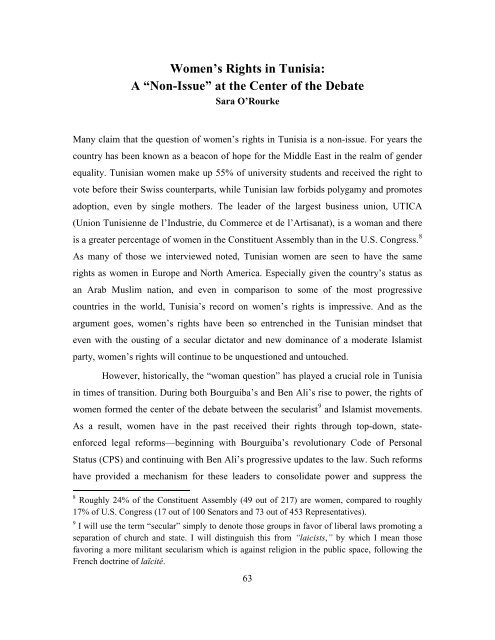Tunisia: Understanding Conflict 2012 - Johns Hopkins School of ...
Tunisia: Understanding Conflict 2012 - Johns Hopkins School of ...
Tunisia: Understanding Conflict 2012 - Johns Hopkins School of ...
Create successful ePaper yourself
Turn your PDF publications into a flip-book with our unique Google optimized e-Paper software.
Women’s Rights in <strong>Tunisia</strong>:<br />
A “Non-Issue” at the Center <strong>of</strong> the Debate<br />
Sara O’Rourke<br />
Many claim that the question <strong>of</strong> women’s rights in <strong>Tunisia</strong> is a non-issue. For years the<br />
country has been known as a beacon <strong>of</strong> hope for the Middle East in the realm <strong>of</strong> gender<br />
equality. <strong>Tunisia</strong>n women make up 55% <strong>of</strong> university students and received the right to<br />
vote before their Swiss counterparts, while <strong>Tunisia</strong>n law forbids polygamy and promotes<br />
adoption, even by single mothers. The leader <strong>of</strong> the largest business union, UTICA<br />
(Union Tunisienne de l’Industrie, du Commerce et de l’Artisanat), is a woman and there<br />
is a greater percentage <strong>of</strong> women in the Constituent Assembly than in the U.S. Congress. 8<br />
As many <strong>of</strong> those we interviewed noted, <strong>Tunisia</strong>n women are seen to have the same<br />
rights as women in Europe and North America. Especially given the country’s status as<br />
an Arab Muslim nation, and even in comparison to some <strong>of</strong> the most progressive<br />
countries in the world, <strong>Tunisia</strong>’s record on women’s rights is impressive. And as the<br />
argument goes, women’s rights have been so entrenched in the <strong>Tunisia</strong>n mindset that<br />
even with the ousting <strong>of</strong> a secular dictator and new dominance <strong>of</strong> a moderate Islamist<br />
party, women’s rights will continue to be unquestioned and untouched.<br />
However, historically, the “woman question” has played a crucial role in <strong>Tunisia</strong><br />
in times <strong>of</strong> transition. During both Bourguiba’s and Ben Ali’s rise to power, the rights <strong>of</strong><br />
women formed the center <strong>of</strong> the debate between the secularist 9 and Islamist movements.<br />
As a result, women have in the past received their rights through top-down, stateenforced<br />
legal reforms—beginning with Bourguiba’s revolutionary Code <strong>of</strong> Personal<br />
Status (CPS) and continuing with Ben Ali’s progressive updates to the law. Such reforms<br />
have provided a mechanism for these leaders to consolidate power and suppress the<br />
8 Roughly 24% <strong>of</strong> the Constituent Assembly (49 out <strong>of</strong> 217) are women, compared to roughly<br />
17% <strong>of</strong> U.S. Congress (17 out <strong>of</strong> 100 Senators and 73 out <strong>of</strong> 453 Representatives).<br />
9 I will use the term “secular” simply to denote those groups in favor <strong>of</strong> liberal laws promoting a<br />
separation <strong>of</strong> church and state. I will distinguish this from “laicists,” by which I mean those<br />
favoring a more militant secularism which is against religion in the public space, following the<br />
French doctrine <strong>of</strong> laïcité.<br />
63
















